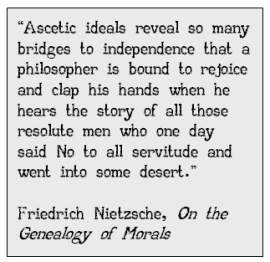WEDNESDAY, 4 FEBRUARY 2015
Imagine someone asks you to make a rather significant monetary contribution to a cause, and you answer, “I can’t really help you. I don’t make much money. It’s not what I do.”
“What do you mean making money is not what you do?” the person asks. “Everyone needs money!”
Not one to let a chance go by to point out a misconception, you confirm that of course most people need money, but that not everyone needs to make money. As examples you point to monks and nuns, the children of rich people, people who have inherited a lot of money, criminals who have stolen enough, and so on.
You explain that you do have a part-time job, but that you make just enough money to pay rent, buy food, pay the bills, and do something fun every now and then. Any extra money is saved so that you can afford to visit your family every year or two.
After going back and forth it might emerge that you do in fact try to make more money.
“Yes,” you admit. “That is so.”
You’re not stupid, you say. You are aware of the benefits of having more money than what you need to buy necessities and pay for necessary things. “So I try to make a little more money, but again, it’s not my first priority.”
“You don’t have children, do you?” the other person asks.
“No,” you reply. “For that I will indeed need a lot more money.”
“If making money is not your first priority, then what is?” the other person asks, by now visibly irritated.
“Like every other human being on this planet,” you start after striking an appropriate pose, “including the man or woman who lovingly raises a family, the man or woman who worships a god in great sincerity, and the man or woman who consumes large quantities of drugs or alcohol my first priority is to try and make my own life worth living. I have discovered that there are things that cost relatively little money that actually make me feel like my life is worth living, much more than was the case when I was merely trying to make as much money as possible and not much else.
“If by who I am and what I do I end up contributing to other people also being more convinced that their lives are worth living,” you add after a brief pause, “that is also good.
“But,” you say, circling back to the start of the conversation, “unfortunately I simply do not make enough money at the current moment to contribute much to this very noble cause.”
Would that be good enough for your interlocutor?
That will be the day.
______________________
